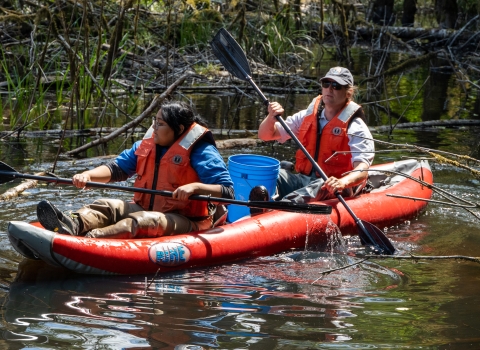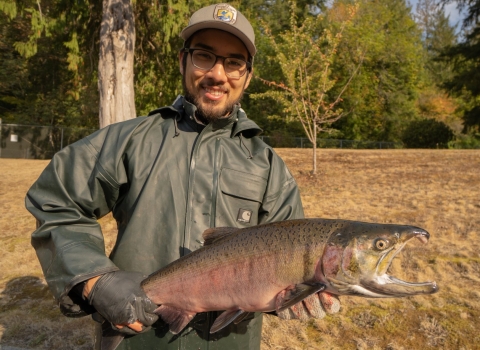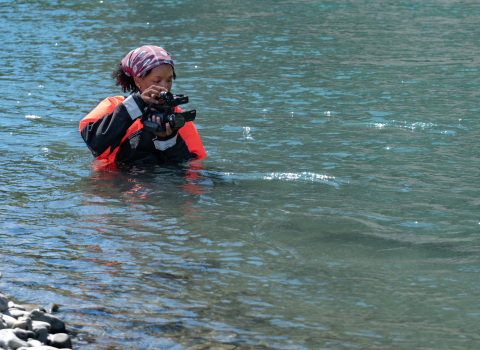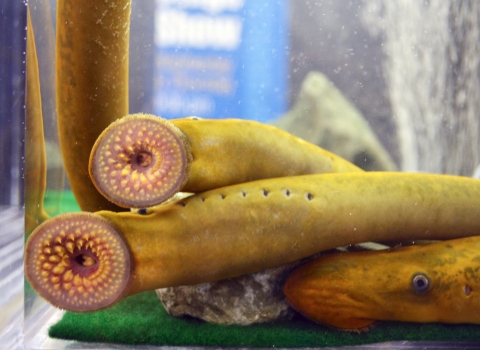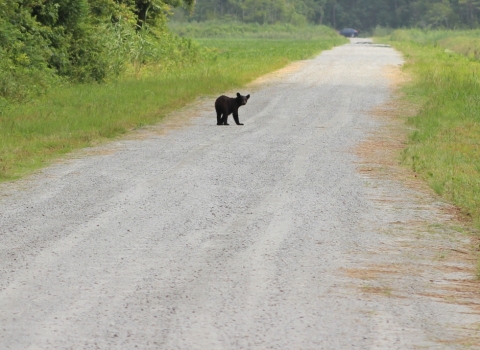By Elena Prest, U.S. Fish & Wildlife Service Intern though Conservation Legacy and the Bureau of Indian Affairs
Editor's Note: Elena Prest served a 6-month internship with the U.S. Fish & Wildlife Service's Western Washington Fish and Wildlife Conservation Office in Lacey, Washington. She also provided valuable support for the Makah, Quilcene, and Quinault National Fish Hatcheries on the Olympic Peninsula as well as a number of conservation partners. Elena’s Tribal "WaterCorps" internship was sponsored by the Bureau of Indian Affairs in partnership with Conservation Legacy. We are thankful for Elena's hard work and dedication as well as the support from these partners.
-----------------------------------------
Hello, my name is Elena. I am a Tribal member of the Skokomish Tribe. I was born and raised here in the state of Washington. As a young girl I was taught to love and respect all life and to show appreciation for the natural resources that fed my people. My parents taught me to love the outdoors. We often spent time together camping, floating down the river, and walking the beach looking for eagle feathers.
Being surrounded by different bodies of water from lakes and the Hood Canal, to the robust and amazing Skokomish River, I was taught to practice my treaty rights by fishing and shellfish harvesting for clams, oysters, and geoduck just as my people have done for generations. These experiences planted the seeds firmly for my growing passion for fisheries and natural resources conservation work.
By age 14, my love for salmon led me to work at my Tribal hatchery where I helped raise chum salmon. I felt the pull to help preserve and to be able to sustain salmon fisheries for future generations to carry on our important tradition of fishing. Since day one at the hatchery, I knew my participation in the process of the salmon life cycle would lead to me finding a career working with salmon.
From the start of this internship, my experience has been packed with extensive field work.
Awesome, right? On the first day in this role, I was in the field at Lake Washington for a predation study. This was a study on which non-native species prey on Chinook fry that come out of the Cedar River into Lake Washington. We collected diet samples by gastric lavage, which is pumping of the fish’s stomach to see what they have eaten, and recorded basic data such as the species of fish and the lengths. These samples were stored away until they could be processed in the lab for diet analysis and genetic analysis of well digested salmon.
An additional opportunity I was able to experience was working on the mass marking trailers. These trailers are used to mark salmon and steelhead for harvest management. The two most widely used ways of marking fish for harvest management are coded wire tags and an external visible mark (mass marking). A coded wire tag is a stainless-steel wire that is placed in a juvenile salmon snout that has numbers or individual codes for specific batches of fish. Mass marking is the removal of the adipose fin which is near the tail of the fish. This whole process of clipping and tagging is used to identify that these fish are from a hatchery.
Another amazing project I really enjoyed being a part of was the Selective Fisheries Project with the Lower Elwha Tribe. Working on the beautiful Elwha River I got to fish using tangle nets and drift down the river in an effort to capture fish and place radio tags in them. Being part of this project I gained skills working as a team, recording data, collecting samples, tracking, and different methods of capturing salmon. This selective fisheries project will help improve a sustainable fishery for the Elwha Tribe. I was inspired by the opportunity to learn about the history of the dam removal to restore fish passageways that were cut off when the dams were built in the early 1900s. This in turn devastated the Elwha Tribe’s way of life and traditions as native people. It is truly a blessing to be able to see the salmon runs and salmon passage in the Elwha River restored. I am privileged to have been able to participate in this project as well as all of the other experiences.
I know I will carry these experiences with me into my next job role. This whole experience made me want to strive towards a degree in fisheries management, to work as a professional assisting in the growth and preservation of salmon. After this internship, I plan on going back to further my education and pave a pathway for a career in fisheries work among the Skokomish Tribe. I am very grateful for this amazing opportunity to gain knowledge and new skills while getting in field experiences.





